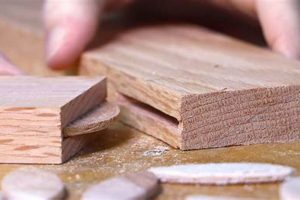
This technique utilizes small, football-shaped pieces of dried, compressed wood, typically beech, to reinforce a joint between two pieces of wood. These pieces, known as biscuits, are inserted into corresponding crescent-shaped slots... Read more »

Joint strength in woodworking refers to the capacity of an assembled connection to withstand force and stress without failing. A joint’s ability to resist pulling, twisting, bending, and shearing forces is a... Read more »

A type of joinery enables pivotal movement between two wooden components. This construction technique facilitates the opening and closing of elements such as doors, lids, and boxes. The functional characteristic involves creating... Read more »

A specialized apparatus facilitates the creation of strong, interlocking corner joints in woodworking projects. This device guides the precise cutting of alternating slots and fingers in two pieces of wood, which then... Read more »

A type of woodworking connection, primarily employed in constructing robust and visually appealing furniture and architectural elements, involves interlocking two pieces of wood through a mortise and tenon arrangement. The tenon, projecting... Read more »

A juncture in woodworking is a connection that unites two or more pieces of timber to create a unified structure. These connections are fundamental to the strength, stability, and aesthetics of wooden... Read more »

A joinery technique characterized by interlocking “fingers” that extend from the edges of two boards being joined. These fingers mesh together, creating a strong and visually appealing corner, often employed in constructing... Read more »

A technique employed in woodworking, this method involves interlocking projections and recesses cut to resemble a dove’s tail in shape. When properly executed, it yields a strong and visually appealing connection between... Read more »

This method of joining wood pieces, often seen in frame construction, utilizes interlocking projections and recesses to create a strong and visually appealing connection. Each piece is precisely shaped to fit together,... Read more »

Devices employed to create strong, precise connections between pieces of lumber are essential for constructing durable and aesthetically pleasing wooden structures. These devices facilitate the creation of mortise and tenon, dovetail, miter,... Read more »


